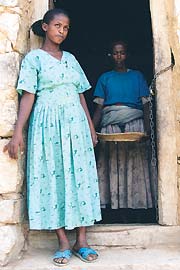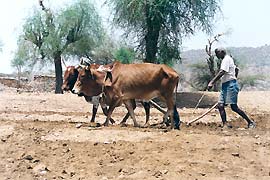Expecting better days after war and drought
31-07-2003
Abrhet Woldegergis a mother of three, lives in the demilitarized buffer zone between Eritrea and Ethiopia.War is now over but it brought hardship to this young Eritrean who, whilst pregnant with her third child, had to flee her village as fighting was getting dangerously close. Today, drought impedes the recovery efforts of Abrhet and her fellow villagers.
About Acrobat PDF files

Abrhet and her mother take pride in not complaining about their present life.
It is hot and dusty in Geza Hamle, a village located some 100 kilometers south of Asmara, the capital of Africa ’s youngest nation, Eritrea. It is late June. The first timid rainfalls have softened the sandy ground and the village farmers are all busy ploughing small pieces of land with their oxen. Abrhet Woldegergis, a 25-year old mother of three, is preparing lunch for her children who are out in the fields.
Abrhet is shy and prefers smiling to talking. When asked about her experiences during the war between Eritrea and Ethiopia (1998-2000), she seems reluctant to recall those difficult times. “Our village, Geza Hamle, is located very close to the border. We were spared from the fighting until May 2000 but then, it came so close that we had to flee leaving everything behind us. The entire population fled north towards Asmara. At that time, I had to take care of my first two children, and I was pregnant with my third. My husband had been enrolled as a soldier, but my parents were with me.”
Two days on foot brought Abrhet and her family to a camp for displaced people in the town of Dubarwa, 25 kilometers south of the capital: “We were amongst thousands of people coming from a widespread area. It was heavily overcrowded. When we arrived, there was no water, no tents. Life was terrible. I did not feel comfortable, because I was expecting my baby soon, and I did not want to deliver in such a place. ”
Living conditions are still harsh
So Abrhet left the camp after one month and headed back home, together with a first group of fellow villagers. When they reached their village, the fighting had stopped and the soldiers were nowhere to be seen. Some found their traditional hidmo houses -built of stone, clay and wood-in ruins. Abrhet had fared a little better: “I lost my three cows, but my house was undamaged, and my belongings were still there.”
After the war, Abrhet ’s village became part of the so-called Temporary Security Zone (TSZ)–a 25 kilometer-wide demilitarized buffer zone on
Eritrean soil, patrolled by UN peacekeepers. Three years after the peace agreement, living conditions within this area are still harsh. Extensive areas are still littered with mines and other explosive remnants of war, putting farmers and shepherds in great danger. The demarcation of the border has not yet started, and many inhabitants do not feel safe enough to resume their pre-war life.
In Abrhet ’s village, the farmers had missed their harvest due to the displacement, and there was no food left. The lack of sufficient rain during the last three years has added to the misery. Last year ’s harvest has been described by agronomists as the worst of the last ten years. On top of that, there are not enough young men left to work the fields. “So we have become dependant on food-aid which was at that time provided by the United Nations and the government, ” says Abrhet ’s mother, busy roasting cereals in a pan. Neither of them like to depend on anyone ’s aid, and nor do they like to complain about their difficult living conditions.
Becoming self-sufficient again

In southern Eritrea, there are not enough young men left to work the fields.
In an effort both to meet the short term needs of the villagers, and to reduce this dependency, the International Committee of the Red Cross (ICRC)launched several relief programmes after the war ended.
Within or close to the buffer zone, damaged health facilities and water supply systems have been rehabilitated. The remaining 60, 000 internally displaced persons (IDPs) living in camps receive shelter, household items and kerosene to overcome the shortage of firewood. After the 2002 disastrous harvest, the ICRC launched a new programme to assist around 100, 000 former IDPs like Abrhet with cereal seeds and food rations, encouraging farmers to grow their own crops and become self-sufficient again.
“My uncle has already sown the seeds on our six acres of land, ” says Abrhet. “We also got wheat grains, lentils, cooking oil, sugar and salt, and thanks to these food donations we are able to survive and work our fields ”, adds her mother. “But you can see for yourself, ” Abrhet says looking towards the fields, “that we have only old men ploughing the land. We just hope that we get enough rain this year. ”